Maine lobstermen warn Biden admin is trying to put them out of business with harsh eco rules
There wouldn't 'be much left' in many rural Maine communities without the lobster industry, a fourth-generation lobsterman tells FOX Business
Whole Foods to stop selling Maine lobsters over risk to endangered whales
Lobster expert Annie Tselikis weighs in on Whole Foods' decision to stop selling Maine lobsters and how that could affect Maine's economy on 'The Evening Edit.'
Industry groups and both Democratic and Republican lawmakers from Maine are sounding the alarm that a pending federal environmental regulation would crush the state's vaunted lobster industry.
The proponents of Maine's nearly $1 billion lobster industry have argued that federal rules aimed at protecting the endangered right whale species from fishing equipment in federally-managed waters are unfairly attacking blue-collar lobstermen who rely on the resource to make a living. They have warned that the regulation threatens the livelihood of thousands of Maine lobstermen and individuals employed in supporting industries.
"I don't know what we would even retrain lobstermen to do. A lot of guys are already talking about potentially selling their boats and moving elsewhere," Patrice McCarron, the executive director of the Maine Lobstermen's Association (MLA), told FOX Business in an interview. "The economy is so rural here that it's, you couldn't overstate how much losing the lobster dollars coming into the communities will debilitate everything."
"It is just such a special and unique situation that we have here in Maine," McCarron continued. "That's why we're all fighting so hard. We're going to do everything in our power to keep this industry going and to keep these families here and to have lobstermen be able to proudly raise their children and see another generation of lobstermen come through because we need that."
BIDEN'S LAVISH LOBSTER DINNER DOESN'T CHANGE HIS HOSTILITY TO SEAFOOD INDUSTRY, FISH GROUPS SAY
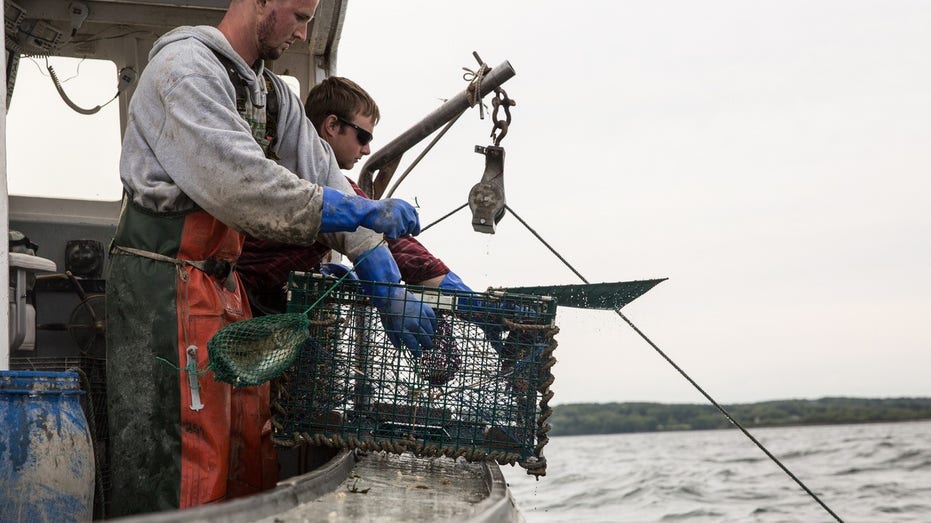
Maine lobstermen haul in their latest catch off the state's coast. (Maine Lobstermen's Association/Marketing Collaborative / Fox News)
In early 2021, the National Marine Fisheries Service (NMFS) — a National Oceanic and Atmospheric Administration (NOAA) subagency tasked with managing federal marine resources — drafted a biological opinion that states fixed gear fisheries including the Maine lobster fishery, must reduce their risk to whales by 98%. In September 2021, the agency modified the rule with more fishery restrictions which were implemented in May. Additional restrictions are slated for December 2024 and 2030.
The new regulations came after a federal judge ruled in favor of environmental groups' challenge to a 2014 version of the rule. The groups had argued the previous regulation didn't do enough to protect whales.
But, as a result of the rule, McCarron said the state's thousands of lobstermen will be forced to remove up to 50% of their fishing gear from the water during peak times of the year in key zones. Lobstermen will also be forced to use weakened rope which could potentially pose a risk to them when hauling their catch out of the ocean using a hydraulic hauler.
DEM LAWMAKER CRITICIZES BIDEN FOR RITZY WHITE HOUSE STATE DINNER SERVING '200 MAINE LOBSTERS'
"The primary threats to North Atlantic right whales are entanglement in fishing gear and vessel strikes," NOAA spokesperson Lauren Gaches told FOX Business in an email. "Climate change is also affecting every aspect of their survival—changing their ocean habitat, their migratory patterns, the location and availability of their prey, and even their risk of becoming entangled in fishing gear or struck by vessels."
Gaches said the agency has estimated that 85% of the right whale population has come into contact with fishing gear which can cause cuts and, sometimes, mortality.
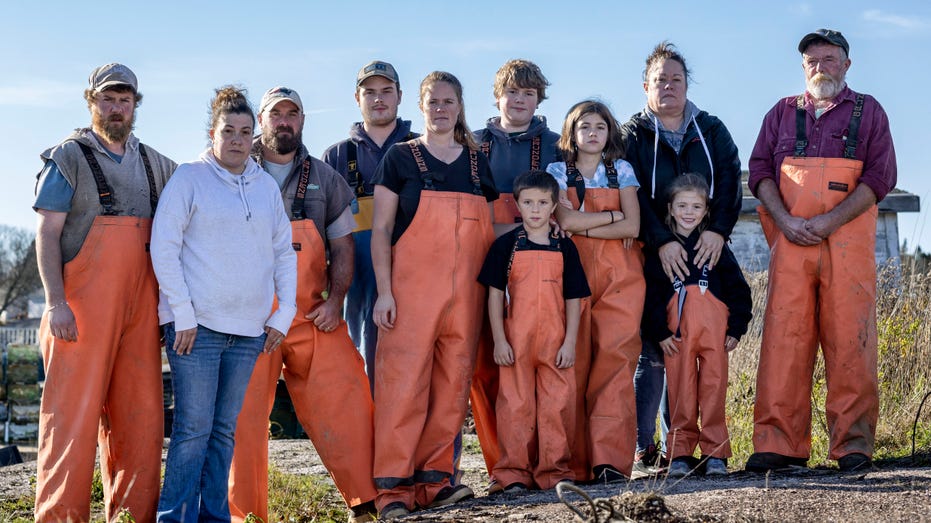
The Bridges family — which includes fourth, fifth and sixth generation lobstermen — from Corea, Maine, is pictured. Bryan Bridges says if he can't sell lobster, it will cause "extreme hardship" for his family. (Cheryl Clegg/Cheryl Clegg Photography / Fox News)
A coalition led by the MLA and joined by the Maine Lobstering Union Local 207, Democratic Gov. Janet Mills and the state's entire congressional delegation have taken on NOAA and environmental groups, including the Conservation Law Foundation and Center for Biological Diversity, who back the regulation.
They have pointed to federal data showing that there has never been a recorded right whale death caused by lobster fishing equipment in Maine and the last recorded whale equipment-caused entanglement came more than two decades ago. The MLA and its allies have accused the federal government of using faulty data inflating the risk the state's lobster industry poses to whales.
"If we had right whales here that were getting entangled in our gear, you can bet that we would be on board with doing everything we possibly could to protect that species," Dustin Delano, a fourth-generation lobsterman and MLA's vice president, told FOX Business. "But the fact of the matter is we don't have them here."
"I fish offshore federal waters as far as I can go and I've never seen one. My dad's never seen one," he said. "I mean, all of our hours together on the water and there aren't any sightings. It's pretty crazy, right?"
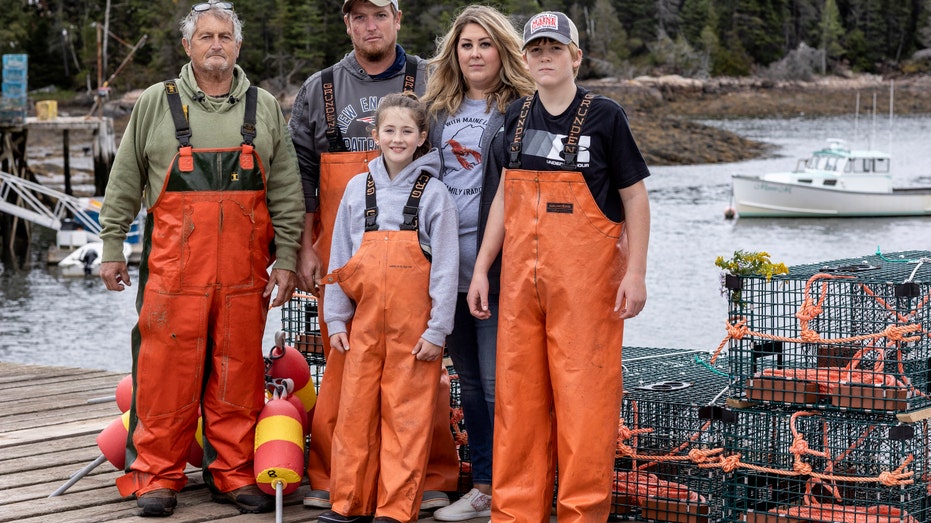
The Renwick family from Bunkers Harbor, Maine, is pictured. Wyliam Renwick said he has fished alongside his dad since he was eight-years-old, but is nervous for his future and "opportunity in lobster fishing." (Cheryl Clegg/Cheryl Clegg Photography / Fox News)
Overall, Maine lobstermen provide the U.S. with about 90% of its lobster supply, making the industry a top economic driver in the state, feeding other related industries as well. In 2021, Maine's lobster fishery generated $724.9 million of revenue, the largest amount in state history.
And under state law, lobstermen are required to own and operate their own vessel, meaning it is exclusively made up of thousands of small business operators. Therefore, according to the MLA, the NMFS rule would primarily impact and shut down small businesses that are vital to rural communities along Maine's coast.
"Friendship, Maine, is the name of the town that I grew up in and that I live in now and where all the previous generations in my family fished and operated from," Delano told FOX Business. "Basically, the lobster industry is the backbone — that's what everything was built around and that's pretty much the only option we have here. Without it, I don't think there would be much left."
MAINE LOBSTERMAN SCORES 1-IN-100 MILLION CATCH: AN ULTRA-RARE COTTON CANDY LOBSTER
Immediately after the Biden administration modified the rule with more stringent restrictions in September 2021, the MLA filed a lawsuit supported by Maine's state government, challenging the regulation. The lawsuit said the federal government's analysis of whale impact was based on faulty modeling and attributes impacts caused by the Canadian fishing industry to the Maine lobster industry.
"Because the 2021 BiOp is based on the simplistic and false premise that more lobster rope in the water equals more risk to whales—regardless of gear type, location, configuration, presence of weak insertions, other mitigation measures, oceanographic conditions, and whale behavior and distribution—it exaggerates and arbitrarily inflates the risk posed by the Maine lobster fishery," the lawsuit stated.
"Even worse, NMFS erroneously attributes impacts to the Maine lobster fishery that are, in fact, caused by other fisheries (such as the Canadian snow crab fishery) or by non-fishing vessels that are well-known to strike and kill North Atlantic right whales," it continued.
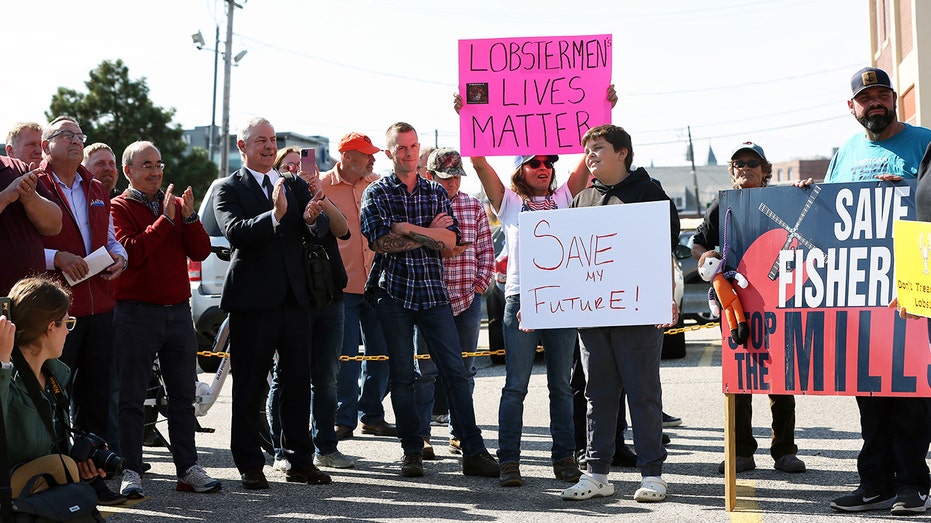
Hundreds of lobstermen, their families, supporters and political figures have rallied urging the federal government to stop proposed rules the fishermen say will decimate their industry. (Ben McCanna/Portland Press Herald via Getty Images / Getty Images)
However, the same judge who struck down the 2014 version of the regulation ruled against the MLA-led coalition in September. The MLA quickly filed an appeal which is currently pending before the U.S. Court of Appeals for the District of Columbia.
Paul Clement, a former U.S. solicitor general hired to represent the MLA, reiterated to FOX Business that the federal government has "relied on speculation and worst-case scenarios to craft an economically debilitating conservation plan."
"The agency's error is even worse because the Supreme Court has admonished regulators ‘to avoid needless economic dislocation’ when pursuing environmental objectives," he said.
MAINE 2021 LOBSTER HARVEST MOST VALUABLE EVER FOR STATE
In addition, Maine's congressional delegation has loudly opposed the Biden administration's decision to move forward with the regulation.
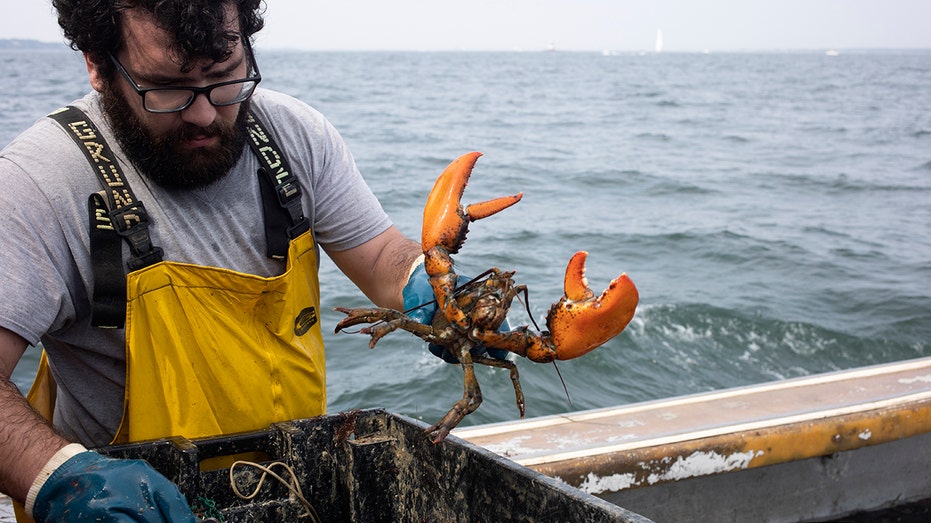
Joe Dean, an Iraq war combat veteran, works on his family's lobster boat, on Aug. 7, 2021. (Andrew Lichtenstein/Corbis via Getty Images / Getty Images)
"The Maine delegation is united in our opposition to these misguided rules instituted under President Trump, and we have been aggressively working with the Biden Administration to support Maine’s lobster industry in every way possible," Rep. Chellie Pingree, D-Maine, told FOX Business in a statement. "While these regulations are being fought in the courts, we are pushing the Biden administration to change course."
"We have also secured millions to help Maine’s lobster industry comply with these onerous rules and invest in accurate research about the true cause of right whale deaths so that NOAA can finally point the finger at the real problem," she added.
MAINE EXAMINES $30 MILLION ANNUAL FUND FOR LOBSTER FISHERMEN AFFECTED BY NEW WHALE RULES
Rep. Jared Golden, D-Maine, recently said he has personally contributed $10,000 to the lobstermen legal defense funds. He also recently demanded that President Biden "take the time to meet with the Maine lobstermen his administration is currently regulating out of business."
Golden, Pingree, Gov. Mills and Sen. Susan Collins, R-Maine, also attended a NOAA town hall in October along with about 200 people to directly voice concerns to federal officials, the Portland Press Herald reported. One lobsterman in attendance said the regulation was "absolutely ludicrous" and would destroy the economy.
GET FOX BUSINESS ON THE GO BY CLICKING HERE
"From the very beginning, the Maine Delegation has been united in steadfastly opposing NOAA’s onerous regulations that will not meaningfully protect right whales but will threaten the livelihood of hardworking Mainers," Collins told FOX Business. "In addition to joining my colleagues in sending multiple letters to the Administration, I have raised this issue directly with Commerce Secretary Raimondo and former Commerce Secretary Ross in four separate hearings, and I have had numerous conversations with agency and White House officials as well."
"The Maine Delegation has repeatedly urged NOAA to reverse course and follow the data, which show that the Maine lobster industry has never been directly linked to a right whale death," Collins said. "Last week, all four members of Maine’s Congressional Delegation met with Governor Mills, the Maine DMR Commissioner, and the Executive Director of the Maine Lobstermen’s Association to strategize on the next actions that we can take to protect our iconic industry and the thousands of Maine jobs it supports."
"We will continue to urge the Administration to follow the science and acknowledge the reality in the Gulf of Maine."





















